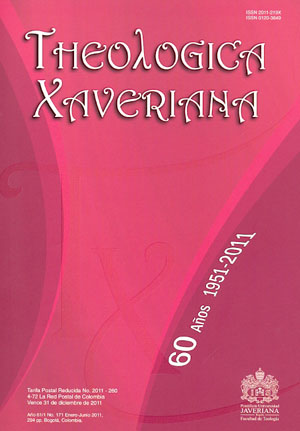Abstract
This following article presents a reflection regarding the particular experience of the priest Camilo Torres Restrepo, who as Colombian, Christian, and revolutionary, undertook a political ideology which lead him into the armed conflict and to his death. By means of the revision his writings and some interviews conducted then by the media, the author tries to reconstructs his ideological itinerary in order to clarify the implications that Christian faith might have on political action. As a core art of this review it is considered his special
interest for the problems of violence, which he assumed as his object of sociological research, weighed up as political strategy, and morally evaluated as revolutionary way.
This journal is registered under a Creative Commons Attribution 4.0 International Public License. Thus, this work may be reproduced, distributed, and publicly shared in digital format, as long as the names of the authors and Pontificia Universidad Javeriana are acknowledged. Others are allowed to quote, adapt, transform, auto-archive, republish, and create based on this material, for any purpose (even commercial ones), provided the authorship is duly acknowledged, a link to the original work is provided, and it is specified if changes have been made. Pontificia Universidad Javeriana does not hold the rights of published works and the authors are solely responsible for the contents of their works; they keep the moral, intellectual, privacy, and publicity rights.
Approving the intervention of the work (review, copy-editing, translation, layout) and the following outreach, are granted through an use license and not through an assignment of rights. This means the journal and Pontificia Universidad Javeriana cannot be held responsible for any ethical malpractice by the authors. As a consequence of the protection granted by the use license, the journal is not required to publish recantations or modify information already published, unless the errata stems from the editorial management process. Publishing contents in this journal does not generate royalties for contributors.


